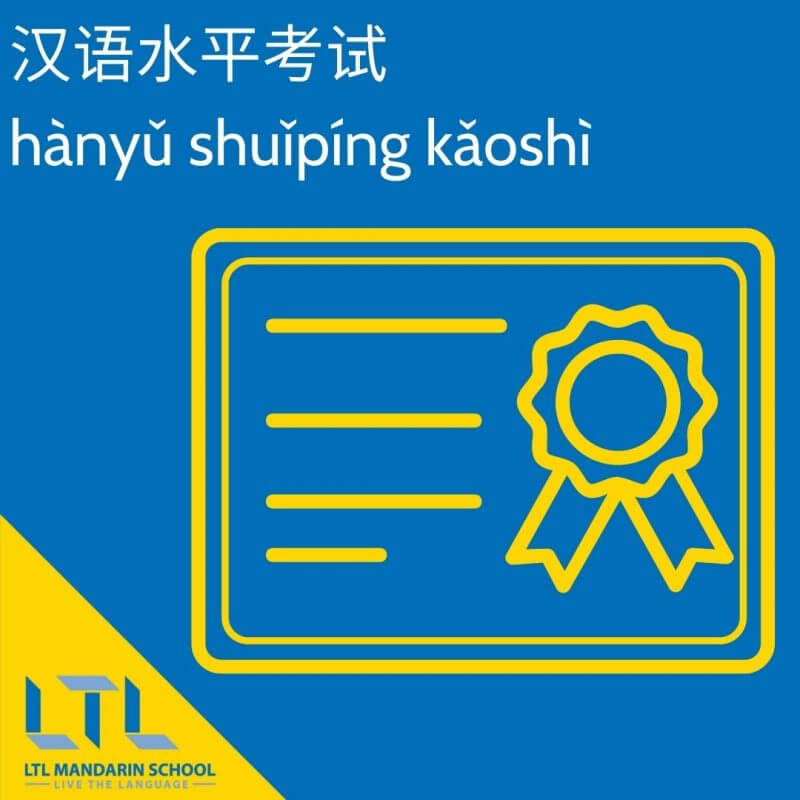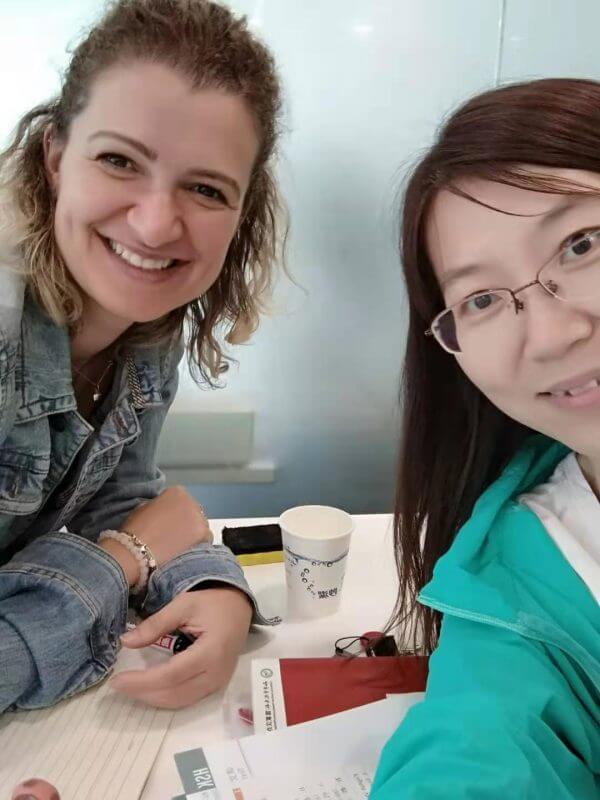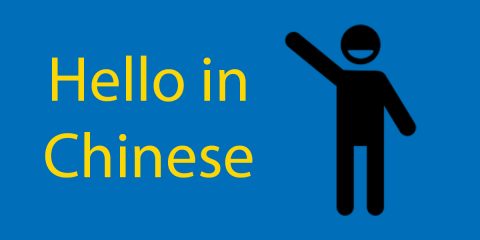HSK vs HSKK // What’s The Difference?
HSK vs HSKK // Your Questions, Answered
A common question we get asked at LTL is what’s the difference between the HSK vs HSKK.

Today’s article will answer all those questions.
If you’re studying Chinese, chances are you’ve heard of the HSK exam.
Most Chinese curriculums worldwide are structured around the HSK levels, and some courses may even require a HSK certificate for graduation. However, not everyone is familiar with the newer HSKK exam.
The difference between the HSK and the HSKK exam is quite simple. The HSK tests listening, reading, and writing abilities, while the HSKK tests speaking abilities.
Since none of the HSK levels include a speaking section, Hanban developed the HSKK as a speaking proficiency test.
This guide will break down the differences between the HSK and HSKK. We will also answer some frequently asked questions about the HSKK and share some tips to help you ace the speaking exam!
HSK vs HSKK | What is the HSK?
HSK vs HSKK | What is the HSKK?
HSK vs HSKK | Important 2022 Update
HSK vs HSKK | HSKK Exam Structure
HSK vs HSKK | Should I Take the HSK or HSKK?
HSK vs HSKK | Can I Take the HSK & The HSKK at the Same Time?
HSK vs HSKK | How to Prepare for the HSKK?
HSK vs HSKK | Tips For Passing The HSKK Exam
HSK vs HSKK | FAQ’s
HSK vs HSKK | What is the HSK?
The HSK stands for Hànyǔ Shuǐpíng Kǎoshì (汉语水平考试), which translates to Chinese proficiency exam.
The test is developed by Hanban, which is the Office of Chinese Language Council International. Hanban also runs the Confucius Institutes around the world, which is where the HSK exams are offered.
The HSK currently consists of six levels, with HSK 1 being the lowest level and HSK 6 being the highest. Here is a breakdown of the six HSK levels:
HSK 1
- Listening and reading sections only.
- Mastery of 150 words.
- Certifies basic knowledge of some Chinese phrases and elementary vocabulary.
- Knowledge of Chinese characters is optional as the entire test includes pinyin.
HSK 2
- Listening and reading sections only.
- Mastery of 300 words.
- Certifies the ability to have simple conversations on a handful of familiar topics.
- Knowledge of Chinese characters is completely optional as the entire test includes pinyin.
HSK 3

- Listening, reading, and writing sections.
- Mastery of 600 words.
- Certifies the ability to have simple conversations in all aspects of everyday life. A student who passes the HSK 3 should have no problems communicating while traveling in China.
- Knowledge of characters is required from HSK 3 and up as the tests no longer include pinyin.
HSK 4
- Listening, reading, and writing sections.
- Mastery of 1200 words.
- Certifies the ability to have simple conversations on a wide range of topics.
HSK 5
- Listening, reading, and writing sections. The writing section includes an 80-character essay.
- Mastery of 2,500 words.
- Certifies the ability to read newspapers and Chinese books, watch TV shows and movies, and give a speech in Chinese.
HSK 6
- Listening, reading, and writing sections. The writing section includes a rewriting assignment that requires you to write a 400-character test.
- Mastery of 5,000 words.
- Certifies a near-native proficiency level of Chinese where you have no issues communicating smoothly on a vast range of topics.

In 2022 the HSK3.0 was launched. Three new levels were added to ultimately align the HSK up with the European framework of A1-C2.
HSK 7-9
- Levels 7-9 consist of a single exam, with the final score corresponding to one of the three levels.
- Passing HSK 9 requires mastery of 11,092 words, which is more than twice as many words as HSK 6.
We have a separate article on the NEW HSK here and you can watch our video guide below.
HSK vs HSKK | What is the HSKK?
As mentioned, the HSKK is a Chinese-speaking test. It measures the test taker’s ability to have conversations and enunciate correctly.
Because the HSK does not include a speaking section, this test was developed as an option for those wishing to certify their Chinese speaking ability.
The HSKK is broken down into three levels:
- Beginner
- Intermediate
- Advanced
Each level roughly corresponds to two HSK levels.
HSKK Beginner
- Corresponds to HSK 1 and HSK 2.
- Mastery of at least 200 words required.
- Certifies the ability to have simple conversations related to everyday life.
HSKK Intermediate
- Corresponds to HSK 3 and HSK 4.
- Mastery of at least 900 words required.
- Certifies the ability to understand everyday Mandarin and have fluent conversations with Chinese speakers.
HSKK Advanced
- Corresponds to HSK 5 and HSK 6.
- Mastery of at least 3000 words required.
- Certifies the ability to have in-depth conversations on a wide range of topics.
Will there be a new HSKK exam?
With the imminent arrival of the HSK 7-9 exam, Hanban may choose to launch a fourth level of the HSKK to correspond to the new HSKK levels.
As of 2021, there has been no announcement indicating that there will be a new level added to the HSKK exam.
For the time being, HSKK Advanced will continue to be the highest level of the HSKK exam.
However, in December 2021 the Hanban announced some changes for 2022:
“Starting from next year, 2022, all overseas HSK3 to HSK6 test takers are required to take both HSK and HSK Oral Test.”
Check out the full details in the next chapter of this article.
HSK vs HSKK | Important 2022 Update
Since 2022, all overseas HSK3 to HSK6 test takers are required to take both HSK and HSK Oral Test.
The written and spoken part will come as a combo package. This change will only affect all overseas HSK testing sites. Testing sites in China will not be affected.
HSK5 and HSK6 candidates must take the Advanced level Speaking test:
HSK 5 + 高级 | Advanced oral test
HSK 6 + 高级 | Advanced oral test
HSK4 candidates must take the Intermediate level Speaking test, and HSK3 candidates must take the Beginner level Speaking test.
HSK 3 + 初级 | Primary oral test
HSK 4 + 中级 | Intermediate oral test
HSK Written and Speaking test result reports will be issued together.
HSK vs HSKK | HSKK Exam Structure
Suppose you’ve taken any of the CEFR exams for European language proficiency. In that case, you may expect the HSKK to involve some live interview or a questions and answers session with a panel of instructors.
However, the HSKK exam is entirely individual. It does not involve any interaction with teachers or proctors. Instead, you will listen to the questions from a recording and answer your questions using a microphone.

Your audio recordings will be sent to the Hanban headquarters, where they will be graded by in-house examiners.
This makes the HSKK a very efficient exam. The full test is only 10-15 minutes long! This is significantly less time than the HSK exam, which can take as long as 130 minutes.
The sections in your exam will depend on what level you choose to take. Here is a breakdown of each section.
Listen & Repeat Section
- The section appears on all three HSKK levels.
- Always the first section of every HSKK exam.
- Test-taker will listen to a sentence and immediately repeat it into the microphone.
- Lasts from 4 to 8 minutes, depending on the level.
Listen & Reply Section
- Section only appears on the HSKK Beginner level.
- Test-taker will listen to a question and reply to it into the microphone.
- Lasts 3 minutes.
Describe the Pictures Section
- Section only appears on the HSKK Intermediate level.
- Test-taker will be asked to describe several pictures displayed on the exam.
- Lasts 4 minutes.
Read Aloud Section
- Section only appears on the HSKK Advanced level.
- Test-taker will be asked to read aloud a passage on the exam.
- Lasts 2 minutes.
Answer Questions
- The section appears on all three HSKK levels.
- Always the last section of every HSKK exam.
- Test-taker will read questions and provide detailed answers by speaking into the microphone.

From 0 to HSK 5 in a Year (How On Earth Did He Do It)
How to Pass HSK 5 (in UNDER a Year) || Karim’s Story I did not know a single word in Chinese when I first came to Beijing in July 2013 to study Mandarin. After finishing high school I decided to…
HSK vs HSKK | Should I Take the HSK or HSKK?
If you want to take the HSK or HSKK from overseas, see the previous chapter.
You are free to take only the HSK, only the HSKK, or both the HSK and the HSKK.
To figure out if you need both or just one of the two, you should first define what you’re trying to get out of an HSK or HSKK certificate.
Remember that the HSK certifies listening, reading, and writing abilities (writing only for levels 3 and up) and the HSKK certifies speaking ability only.
If you are trying to prove proficiency in Chinese, then the HSK is the universally accepted way to do so.
If you are looking for a way to certify speaking abilities only, then the HSKK is the way to go. Perhaps you’re applying for a job that requires customer service skills in Chinese. This is a case where the employer might be more interested in your speaking abilities than your reading abilities.
Keep in mind that if you are considering enrolling in a university program with Chinese as the language of instruction, you will need the HSK exam.
Undergraduate and graduate degrees in China usually require foreigners to pass the HSK 4 or 5 (with a few advanced degrees requiring HSK 6), but most of them won’t need a HSKK certificate.
If a university program or scholarship does require an HSKK certificate, it is usually only the HSKK Beginner level. We have not seen many programs that require HSKK Intermediate or above.
Our suggestion is to only focus on the HSK exam unless you are looking for a job that involves a lot of speaking in Chinese.
Even then, you will probably want to have both the HSK and HSKK certificates to fully showcase your proficiency.
HSK vs HSKK | Can I Take the HSK & the HSKK at the Same Time?
If you want to take the HSK or HSKK from overseas, see the previous chapter.
Yes. Whenever the HSKK is offered, it is scheduled right after the HSK exam. This will allow students to take both the HSK and the HSKK on the same day.
Just keep in mind that the HSK is offered much more frequently than the HSKK. While the HSK is offered about once a month, the HSKK is only offered once every 2-3 months.
If you’re interested in taking both exams on the same day, you should plan in advance as not every HSK test date is also an HSKK test date.
HSK vs HSKK | Is the HSKK Worth it?
Whether the HSKK exam will be worth it to you depends on your personal circumstances as well as your goals.
As mentioned earlier, the HSKK is really only helpful if you’re:

- Applying to a program or scholarship that requires HSK plus HSKK Beginner, or
- Applying for jobs that require advanced speaking abilities.
In the first case, you will want to complete the HSKK Beginner to fulfill the requirement.
It is probably not worth studying for the Intermediate or Advanced levels if you’re trying to meet application requirements.
In the second case, you might very well benefit from taking the HSKK Intermediate or HSKK Advanced.
This is only if you’re certain that the type of job you are looking for requires a lot of speaking in Chinese, like a salesperson or a project manager.
HSK vs HSKK | How to Prepare for the HSKK?
Preparing for the HSKK exam is a little more complex than preparing for the HSK exam.
- Firstly, there are tons of resources available for the HSK since it is much more popular than the HSKK.
- Secondly, it’s hard to work on your speaking ability without the help of a teacher or Chinese friends.
You have to get creative when preparing for the HSKK exam. Here are some of our study strategies for passing any of the three HSKK levels.
Take Small Group Classes
The keyword here is small. If you want to focus on your speaking abilities, you need classes where the class size is small enough to allow you to speak multiple times in class.
If you’re taking a large online class, whether it be in-person or online, you will not have many opportunities to speak and practice your speaking abilities.
If your class size is restricted to, say, 5 students maximum, then you will find multiple opportunities to speak with the teacher and your classmates.
LTL Mandarin offers small group classes 24/7 through our revolutionary Flexi Classes system.

If you are between HSK 0 and HSK 4, we offer small group classes every hour of the day, seven days a week.
Just sign up for your preferred class and you’ll find the help of a certified Chinese teacher in a class setting that is designed to get you speaking.
Not only are all of our Flexi Classes capped at 5 students, but our average class size is under 2 students!
This means that you will have just one other classmate or no classmates at all in most of your Flexi Classes. This way, you can maximize your speaking time while allowing the instructor to correct you.
The best part is, even if you’re the only student in the class, you still pay group class prices for what is essentially a private tutoring session.
Watch Chinese Movies & TV Shows
A great way to supplement your small group classes is to watch Chinese movies and TV shows.
Listening to Mandarin audio for a long time will allow you to discern the tones more easily.
This is a skill that is invaluable for speaking, as a single incorrect tone can completely throw off the listener.
Once you get to a more advanced level (say, HSK 5 and above), you should be able to easily enjoy Chinese media to the point where watching it will be less of a study chore and more of an enjoyable activity.
This should be the end goal of every serious learner, as enjoying native content is one of the clearest signs of real proficiency.
You can check out our list of recommended Chinese Dramas as well as our list of recommended Chinese TV shows for some suggestions on where to get started!
Listen to Podcasts
Another great way to increase your Chinese audio input is to listen to podcasts.
You can very easily put on a Chinese podcast to listen to while you’re driving, cooking, taking a shower, or taking a walk.
Podcasts also have an added layer of difficulty as you will have to rely entirely on your ears to understand what is going on. Unlike with TV shows and movies, you will not have any visual context to understand situations.
The good news is that there are tonnes of Chinese language podcasts out there for Chinese language learners.
You will surely be able to find a podcast that is suitable for your level.
Check out our list of podcast recommendations here.
Use Recordings With Transcripts to Read Aloud
This is one of the more intentional ways to work on speaking ability. Though it can be a difficult way to study, it is certainly productive.

First, you will want to find native audio that comes with a transcript. This transcript can either be characters or pinyin, but pinyin is likely a better choice for this particular exercise.
A great place to find native audio along with a transcript is the Global Language Online Support System.
This is a free resource from the US Defence Language Institute Foreign Language Center.
You will then want to listen to the audio and read aloud the transcript. First, do these separately, and then do them at the same time.
The goal should be for you to be able to read the transcript in sync with the audio.
This exercise is a lot tougher than it seems, and it will likely take you many readings before you can read the transcript out loud seamlessly.
As long as you don’t get discouraged, this is a great way to hunker down and put in some heavy work into your speaking ability.

Chinese Radicals Quiz // How Many Do You Know?
Mandarin features a grand total of 214 radicals, which is a lot (too many!). We’ve chosen 30 of the most common ones for this Chinese radicals quiz
Find a Language Partner
Another great way to prepare for the HSKK is by finding a language partner.
A language partner is someone who can speak your target language and is also learning your native language.
That way, you establish a mutually beneficial relationship where they help you with your Chinese while you help them with their target language.

The hardest part is finding someone who is not only a native Chinese speaker interested in learning your native language but is also interested in the same things that you are.
If you two do not have much in common, the conversations will be pretty dry and will likely not last long.
Luckily, there are many places where you can try looking for a language exchange partner.
- The Language Exchange Subreddit is a great place to find language partners. You can look at the ads that people post or you can post an ad yourself with some details on the kind of person you are looking for.
- HelloTalk is an app that connects you with suitable language exchange partners. This app was designed specifically for this purpose, so the messaging options include fantastic features like grammar and spelling correction.
- Tandem works almost like a dating profile, except that you’re trying to find suitable language partners instead of dates. People will create profiles where they describe their hobbies and interests, making it easier to find someone you have things in common with.
HSK vs HSKK | Tips For Passing The HSKK Exam
If your HSKK exam date is coming up and you don’t have much time to study, you can follow these tips to maximise your HSKK exam score.
Get in the Mood
The single best thing you can do before the test is to listen to a lot of Chinese.
Get your brain listening to and thinking in Chinese right before the test!
If you’re taking the HSK exam immediately before the HSKK, the first test will surely set your brain to Chinese mode.
If you’re not taking the HSK exam that same day, try watching Chinese TV shows the morning before your exam. You can also listen to Chinese music on your way to the test centre.
All the exposure to Chinese you can get before the test will give you an edge as you won’t waste precious exam time switching to Chinese.
Remember that the test is only a maximum of 15 minutes long, so there is no time to waste!

14 Chinese TV Shows for Practicing Your Chinese
The Very Best Chinese TV Shows to Learn Chinese When it comes to learning Chinese, Chinese TV shows is a huge resource. How many times have you complained that you can read or write Chinese okay (which is no small…
Study From Past Exam Papers
If you’re in a time crunch, the best thing you can do is review past exam papers to get a sense of the kind of questions you will see on exam day.
Hanban publishes old HSKK exams in book form.
You can get the Official Examination Papers of HSKK 2014 here.
Don’t Try Too Hard!
This tip might be counter-intuitive, but don’t try too hard!
Remember that you can’t force yourself to learn everything you need to know for the HSKK in a short period of time.

You’ve undoubtedly already put in a lot of work over the past few months or even years.
Come exam day, make sure you relax and trust that what you have studied in the past will be enough to earn you that HSKK certificate.
Getting nervous will only increase your chances of accidentally messing up, so make sure to channel that nervousness and turn it into excitement.
At LTL Mandarin School, we believe that learning a language is a wonderful experience that should never be stressful.
If you feel like you need extra help to ace the HSKK, don’t worry, just get in touch with us and see how one of our skilled Mandarin teachers can help.
Good luck and 加油!
HSK vs HSKK | FAQs
What’s the difference between the HSK and the HSKK?
The difference between the HSK and the HSKK exam is quite simple.
The HSK tests listening, reading, and writing abilities, while the HSKK tests speaking abilities. The HSKK exam is a supplementary test to the HSK.
What does HSK stand for?
The HSK stands for Hànyǔ Shuǐpíng Kǎoshì (汉语水平考试), which translates to Chinese proficiency exam.
When was the New HSK launched?
HSK 3.0 was launched in March 2022.
Three new levels were added to ultimately align the HSK up with the European framework of A1-C2.
What is the HSKK?
The HSKK is a Chinese-speaking test. It measures the test taker’s ability to have conversations and enunciate correctly.
Will there be a new HSKK exam?
With HSK 3.0, all overseas exam takers for levels 3 to 6 are required to take the HSKK at the same time as the HSK exam. More details in our article.
How long is the HSKK exam?
During the HSKK you will listen to the questions from a recording and answer your questions using a microphone.
Your audio recordings will be sent to the Hanban headquarters, where they will be graded by in-house examiners.
This makes the HSKK a very efficient exam as the full test is only 10-15 minutes long!
This is significantly less time than the HSK exam, which can take as long as 130 minutes.
How often are there HSKK exams?
Keep in mind that the HSK is offered much more frequently than the HSKK.
While the HSK is offered about once a month, the HSKK is only offered once every 2-3 months.
Want more from LTL?
Want to learn Chinese from the comfort of your own home? Then our 24/7 online Chinese lessons might be the thing for you.
We offer a 7 day free trial to all new online students where you can study Mandarin 24/7.
Come and check it out free of charge and see what you think!
If you wish to hear more from LTL Language School why not join our mailing list?

















 Hi, my name is Manuel! I am from Spain and I am a Student Advisor at LTL and I’m based at our Taipei school.
Hi, my name is Manuel! I am from Spain and I am a Student Advisor at LTL and I’m based at our Taipei school. Hi, my name is Mojca! I am from Slovenia in Europe and I work as a student advisor at our Shanghai school.
Hi, my name is Mojca! I am from Slovenia in Europe and I work as a student advisor at our Shanghai school.



1 comments
[…] Qui puoi trovare le differenze tra HSK e HSKK. […]